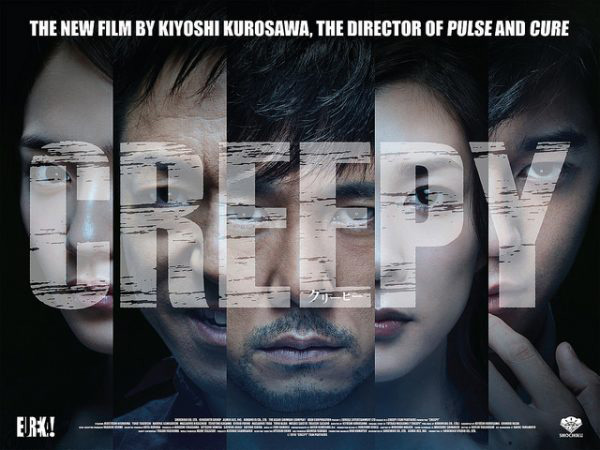by Ren Zelen
Creepy is the latest feature from the prolific Japanese director Kiyoshi Kurosawa. Written by Kurosawa and Chihiro Ikeda, Creepy is a dark and oddly droll adaptation of the novel by Yutaka Maekawa.
The film opens in an interrogation room where a detective, Takakura (Hidetoshi Nishijima) is questioning a serial killer. The murderer is smiling and relaxed – Takakura is fascinated by this example of a ‘perfect psychopath’ and is eager to continue examining the prisoner.
His overzealous professional curiosity brings about a harrowing situation, as moments later, the killer breaks free and ends up threatening the police and holding a fork to the throat of an innocent woman. Takakura fails to defuse the hostage situation and the result is that the smirking killer and his hostage end up dead and Takakura is himself seriously injured.

The story then divides into two parallel narrative tracks – A year later, having resigned from the force after this debacle, Takakura works as a professor of criminal psychology at a local university. He and his wife, Yasuko (Yuko Takeuchi) move into a new home in a Tokyo suburb with their dog.
One day Takakura’s former protégé, a young detective called Nogami (Masahiro Higashide), drops by the college to see his old boss and to ask him for help on a cold case. It involves the unsolved disappearance of the Honda family, which left behind a mourning daughter, Saki (Haruna Kawaguchi) who claims to remember little of the events leading up to the disappearance. Intrigued, Takakura agrees to unofficially assist in reinvestigating the case.
As Takakura questions Saki and pursues leads to solve the mysterious disappearances, his wife Yasuko attempts to settle into their new home, which includes trying to befriend the neighbours. They prove an inhospitable bunch, none weirder than a man called Mr. Nishino (Teruyuki Kagawa) who claims to be a financial analyst living with a sickly wife and a teenage daughter.
Out of loneliness, curiosity and politeness, Yasuko remains pleasant and communicative to Nishino, who, after initially being hostile, abruptly turns into a smiling, attentive and ingratiating charmer. This swift, unexpected change is itself a mystery, but it appears to have a direct connection to her husband Takakura’s rapidly developing cold case.
Eventually, the story lines and characters converge and the mystery is revealed, although not necessarily explained. It does however, tragically lead back to Takakura’s interest in the ‘perfect psychopath’.
Creepy is classified as a horror movie and, on one level, it can be seen as such. Kiyoshi Kurosawa is a master of unease and of the gradual build-up. His movies are populated with malignant forces (living or dead) but the truly disturbing moments are not the goriest ones. We are often most unsettled by gradual shifts, that turn the mundane into the menacing and unfathomable.

Somewhat like David Lynch, Kurosawa tends to merge the macabre and the everyday in a way that comes to reveal a lurking evil. In his films (which include Cure and Pulse, both classics of modern J-horror) an eerie atmosphere of menace begins to emanate from familiar situations and locations.
Here, Teruyuki Kagawa’s sly performance as the sinister neighbour Mr. Nishino, is what gives Creepy its title. Nishino belongs in the roster of oddest next-door psychos – switching between unamicable and surly to flirtatious and ingratiating, but we never fully understand his motivation or background, which means we never know quite what to expect.
Creepy certainly lives up to the name, but it also offers the puzzle of a detective story, the emotional undercurrents of a domestic drama and the suspense of a psychological thriller. In his film Kurosawa also examines the unhealthy divide between family and work, and the extremities of love, perception and curiosity. In Creepy, trusted logic and homely comforts gradually become perverted into something freakish and uncanny.

